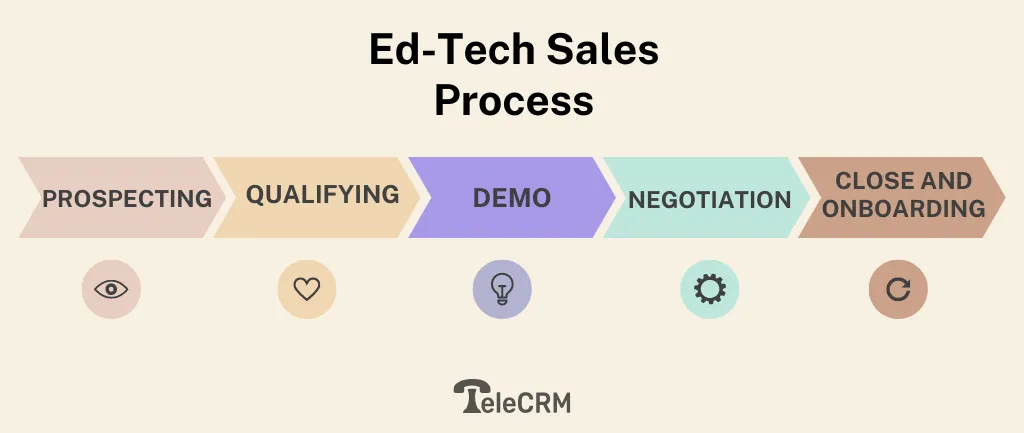EdTech companies face a unique set of challenges when it comes to sales. While their products are often innovative and offer a range of benefits to both educators and students, they must also contend with a crowded market and the need to continually adapt to changing technologies and educational trends.
As EdTech companies continue to grow and gain popularity, it is important that they have effective sales strategies in place to reach their target audience. The SaaS model has proven to be an effective way to sell software to customers, but it poses unique challenges for sales teams.

Here are some key sales strategies that EdTech companies should consider to stay ahead of the curve.
Defining an Identity is Crucial to Securing Sales
Identify your target audience
Before you can sell your product, you need to understand your target audience. Who are your ideal customers? What are their pain points? What motivates them to buy? Knowing the answers to these questions will help you tailor your sales pitch to each individual customer.
Build a strong online presence
Your website is often the first point of contact between potential customers and your company. Make sure your website is well-designed, easy to navigate, and provides all the information customers need to make a decision. Use social media platforms to engage with customers and build your brand.
Utilize customer testimonials
Customer testimonials are a powerful tool in the sales process. When potential customers see that others have had a positive experience with your product, they are more likely to trust your company and make a purchase. Reach out to satisfied customers and ask if they would be willing to provide a testimonial.
Create high-quality content
Creating compelling content is an effective way to attract potential customers and educate them about your product. Blog posts, whitepapers, e-books, and case studies are all great ways to showcase your expertise and provide valuable information to customers. Make sure your content is well-written, informative, and tailored to your target audience.
Get to know the basics: How to Sell SaaS…
Key Sales Strategies for EdTech SaaS Companies
Use a data-driven approach to customer acquisition
One of the most important things that EdTech companies can do to generate new leads is to use a data-driven approach to customer acquisition. This means leveraging data and analytics to identify the most promising leads and develop targeted marketing and sales campaigns that speak directly to their needs and pain points.
For example, an EdTech company that specializes in online learning platforms might use data to identify schools and districts that have a high need for remote learning solutions. They could then develop a targeted marketing campaign that emphasizes the platform’s ease of use, scalability, and other features that are particularly relevant to those schools and districts.
Leverage the power of social proof
In the world of EdTech, social proof is critical. This means using testimonials, case studies, and other forms of social proof to demonstrate the value of your product and build trust with potential customers.
For example, an EdTech company that specializes in adaptive learning software might showcase success stories from teachers and students who have seen significant gains in student achievement as a result of using the platform. By highlighting these success stories and demonstrating the tangible benefits of the product, the company can build credibility and establish itself as a trusted provider of high-quality EdTech solutions.

Emphasize the importance of data privacy and security
As EdTech products become increasingly integrated into the educational landscape, concerns around data privacy and security are becoming more pressing. EdTech companies must take proactive steps to address these concerns and assure potential customers that their data is safe and secure.
This might involve implementing stringent security protocols, partnering with third-party security providers, and developing clear and transparent policies around data privacy and security. By emphasizing their commitment to data privacy and security, EdTech companies can build trust with potential customers and position themselves as responsible and trustworthy providers of innovative educational technology solutions.
Outlining a Successful EdTech Sales Process
Leverage the power of personalization
Finally, EdTech companies should focus on leveraging the power of personalization to retain customers and encourage repeat business. By tailoring their products to the specific needs and preferences of individual users, companies can create a more engaging and personalized experience that encourages loyalty and repeat usage.
For example, an EdTech company that specializes in language learning software might use machine learning algorithms to personalize the learning experience for each individual user, adapting the content and pacing of the lessons based on their progress and preferences.
In conclusion, EdTech companies face unique challenges when it comes to sales, but by using a data-driven approach, leveraging the power of social proof, emphasizing data privacy and security, and focusing on personalization, they can establish themselves as trusted providers of innovative and effective educational technology solutions.
Embrace a consultative sales approach
The EdTech market is highly competitive, with a wide range of products and services available to educators and students. As a result, EdTech companies must differentiate themselves by offering unique value propositions and demonstrating a deep understanding of their customers’ needs.
One way to do this is by adopting a consultative sales approach. Rather than simply selling products and services, EdTech companies can position themselves as trusted advisors who work closely with educators and school administrators to identify their unique pain points and provide tailored solutions.
According to a study by Salesforce, 82% of business buyers want vendors to demonstrate a deep understanding of their business, and 86% want vendors to provide advice and thought leadership. By adopting a consultative sales approach, EdTech companies can meet these expectations and build stronger, more meaningful relationships with their customers.
Leverage the power of referrals and word-of-mouth marketing
Referrals and word-of-mouth marketing are some of the most effective ways for EdTech companies to generate new leads and build their customer base. According to a study by Nielsen, 92% of consumers trust recommendations from friends and family above all other forms of advertising.
To leverage the power of referrals and word-of-mouth marketing, EdTech companies must focus on delivering exceptional customer experiences and building strong relationships with their customers. This means providing responsive customer support, regularly soliciting feedback, and implementing changes based on customer input.
Additionally, EdTech companies can incentivize referrals by offering discounts, free trials, or other rewards to customers who refer new business. By taking a proactive approach to referrals and word-of-mouth marketing, EdTech companies can generate high-quality leads at a lower cost than traditional marketing channels.
Focus on the benefits of digital transformation
As the education landscape continues to evolve, digital transformation is becoming increasingly important for schools and districts around the world. EdTech companies can position themselves as key partners in this transformation by emphasizing the benefits of digital technology for educators and students alike.
According to a report by Deloitte, digital technology has the potential to improve student outcomes, increase teacher effectiveness, and reduce administrative costs. By highlighting these benefits and demonstrating the ways in which their products and services support digital transformation, EdTech companies can establish themselves as thought leaders and trusted partners in the education space.
Leverage the power of social media and content marketing
Social media and content marketing are powerful tools for EdTech companies to build brand awareness, engage with customers, and generate leads. According to a study by HubSpot, companies that publish 16 or more blog posts per month generate 3.5 times more traffic and 4.5 times more leads than companies that publish 0-4 posts per month.
To leverage the power of social media and content marketing, EdTech companies must develop a robust content strategy that speaks directly to their target audience. This might involve creating blog posts, videos, infographics, and other types of content that address common pain points and provide actionable solutions.
Additionally, EdTech companies can use social media to build relationships with their customers and generate buzz around new products and services. By sharing valuable content, engaging with customers, and actively participating in social media conversations, EdTech companies can establish themselves as thought leaders and trusted partners in the education space.
Before you continue reading…
You can also explore our Brand Positioning Audit Guide.
There are two things required to reach a destination – first to know where you want to go, but second to also know where you stand today. It’s true, if we asked Google maps to direct us to Pittsburgh, but it had no idea where we were then it could not show us the path we need to take.
Key Takeaways
EdTech companies face a unique set of challenges when it comes to sales, but by adopting a consultative sales approach, leveraging referrals and word-of-mouth marketing, focusing on digital transformation, and leveraging the power of social media and content marketing, they can establish themselves as thought leaders and trusted partners in the education space.

